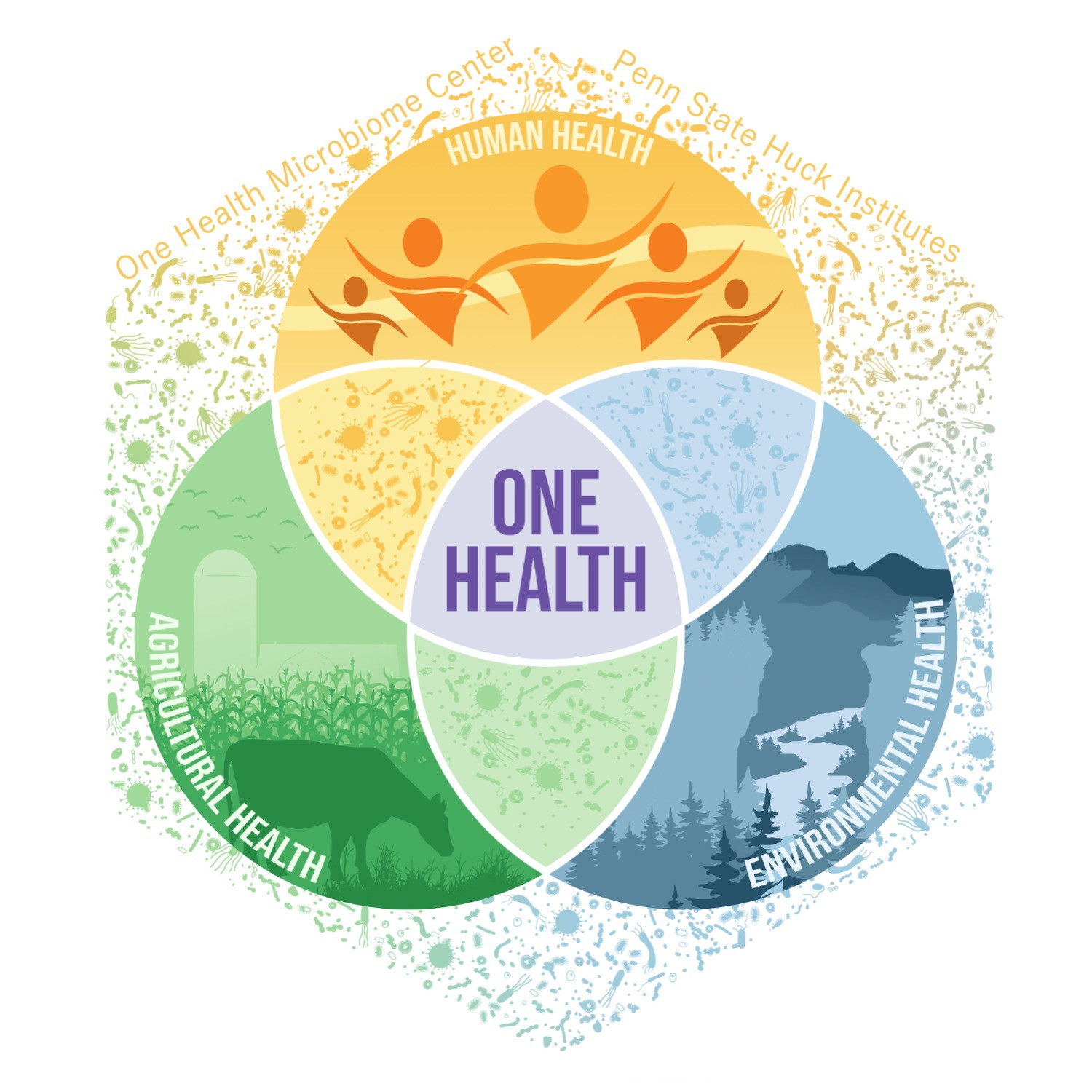What
What is the human microbiome…
We humans are partly microbes. Over 100 trillion of them live on and inside our bodies. In fact, the number of microbes in an average human body is about the same as the number of human cells. Most of them can be found in our gut, particularly in the large intestine.
The microbiome is the genetic material of all these microbes and contributes to the broader genetic portrait, the metagenome, of a human. The composition of the human microbiome is unique in each individual. Different people harbour different collections of microbes – among which you encounter bacteria, archaea, fungi, protozoa and viruses – and we are only beginning to understand what leads to this variation.


Credit: Sam Muller / Penn State. Creative Commons
What
…and why does it matter beyond us?
Overall, the human microbiome is just one piece of a larger picture.
Microbiomes exist in soils, oceans, animals, and built environments. They are interlinked, responsive, and co-evolving. Changes in environmental microbiomes can affect human health; antimicrobial resistance can emerge from animal systems; and shifts in diet, farming, or urbanisation ripple across microbial ecosystems.
This is why the One Health approach, which recognises the interconnectedness of human, animal, and environmental health, is essential to microbiome research.
Human Microbiome Action contributes to this broader perspective by helping to coordinate and harmonise microbiome science across sectors. From standards and reproducibility to regulatory readiness, we focus on the tools and frameworks needed to ensure microbiome research has impact, across disciplines, and across the One Health landscape.
01
Supporting the immune system
The gut microbiome has multiple ways to help and train your immune system to fight back harmful intruders.
02
Providing nutrients
Bacteria in the gut have the ability to break down indigestible food components into nutrients like vitamins or short-chain-fatty acids which are an important energy source for gut cells.
03
Preventing diseases
A diverse microbiome is assumed to have a lot of beneficial influences and might prevent different diseases.
How
How does the human microbiome relate to health?
The microbes living in and on us are generally not harmful, rather they are considered beneficial colonizers that are essential to maintain health. They help us break down our food to extract essential nutrients, produce certain vitamins and amino acids, regulate our immune system and fight off disease-causing microbes. Changes in the microbiome have been linked to numerous disease states such as obesity, diabetes, allergies and even anxiety, depression and autism. Most of these diseases are associated with imbalances in the gut microbiome, called dysbiosis, which have severe consequences for the host. This imbalance may result from an excess of harmful microbes and/or a lack of beneficial microbes to the host.
How
How does the microbiome relate to One-health?
01
Linking Human and Animal Health
Microbiomes in animals influence human health through shared pathogens, antimicrobial resistance, and even the transmission of beneficial microbes. Understanding animal microbiomes can help prevent zoonotic diseases and improve food safety.
02
Shaping Environmental Health
Soil and water microbiomes play vital roles in agriculture, nutrient cycling, and pollution breakdown. Disruptions in these ecosystems—through monoculture farming, chemical exposure, or other unsustainable practices—can degrade microbial diversity, affecting both environmental sustainability and human health outcomes.
03
Responding to Urbanisation and Climate Change
Urban environments and global warming are reshaping microbial communities in the air, water, and built environment. These shifts can influence immune system development, pathogen exposure, and even chronic disease risk. At the same time, emerging contaminants—such as PFAS (forever chemicals) used in industrial and consumer products—accumulate in ecosystems and may disrupt microbiomes in both humans and wildlife, compounding health and ecological risks.
04
Driving a Holistic Understanding of Health
The One Health approach encourages us to see health as a system—not just individual well-being, but the balance of ecosystems, animals, and people. Microbiomes are at the center of this shared biology.
Vision
What is a “healthy” microbiome and what influences the composition of our microbiome?
Defining what a healthy microbiome is proves to be a very difficult task, simply because there are many things we don’t know yet. Even in healthy people, there are immense variations in the composition of the microbiome, making the concept of a healthy microbiome very challenging. However, there are certain things that we do know. For example, that there is a strong link between a high microbial diversity in the gut and overall health, while a relative lack of diversity is common in many diseases. If one thing is for certain, it is that the microbiome is subject to constant change. Although a person’s microbiome is originally determined by one’s DNA and the transmission of microbes from mother to infant in the birth canal, it changes with age, the effects of diet, medications, ethnicity, geography, and lifestyle. It is also increasingly clear that environmental exposures, such as pollutants, antibiotics in food systems, and broader ecological changes, can influence our microbiomes, reinforcing the importance of a One Health perspective.

Why
How can we use microbiome knowledge to improve human health?
A more complete understanding of the diversity of microbes in the human microbiome could lead to new diagnostic tools, therapies and preventative strategies for numerous human diseases. For instance, imagine treating a bacterial infection caused by “bad” bacteria by growing more “good” bacteria!1 Ongoing research and joint effort in microbiome science will help improve human health as we become better at characterizing and manipulating the microbiome in a targeted way.2 It is also expected to shed light on fundamental aspects of human physiology and particularly human nutrition. A better understanding of the microbiome’s role in nutrition will produce changes in dietary recommendations, as well as in food production. This knowledge is not only relevant for individuals, but also for improving the health of populations, animals, and ecosystems
Why
Therapeutic applications and areas of interest
Personalized medicine
With the advancement of sequencing technologies, analyzing an individual’s microbiome becomes easier and more affordable. Our knowledge about the interactions between the microbiome and drug metabolism and the microbiome’s role in disease development can support doctors in personalizing healthcare not only to the individual but also to their microbes.
Nutrition
Just as for medicine, the most relevant component to personalization in nutrition likely resides in our microbiome. Microbiome data can give us insights into how an individual’s digestive system responds to different types of food. Determining an individual’s microbiome composition is therefore likely to help health care professionals in creating personalized dietary recommendations.
One Health
Microbiome research doesn’t stop at the individual. Microbial ecosystems in animals, plants, soils, and water all interact with human health in complex ways. One Health applications of microbiome science include managing antimicrobial resistance, monitoring environmental pollutants, and improving animal welfare and sustainable agriculture. As we learn more about these connections, microbiome data will increasingly inform public health, veterinary care, and environmental protection strategies, bringing health innovation beyond the clinic and into the ecosystem.
Discover the many faces of #HumanMicrobiomeAction and #MicrobiomeAmbassador!
The Human Microbiome Action project connects microbiome experts from all over the world. Make sure to follow our @SciFoodHealth Twitter and LinkedIn channels for #HumanMicrobiomeAction to stay up to date about the most recent activities within the Human Microbiome Action project!
Interested in what is so exciting about the microbiome? Hear it first hand from our project partners and members of our Stakeholder Advisory Board under the hashtag #MicrobiomeAmbassador!
